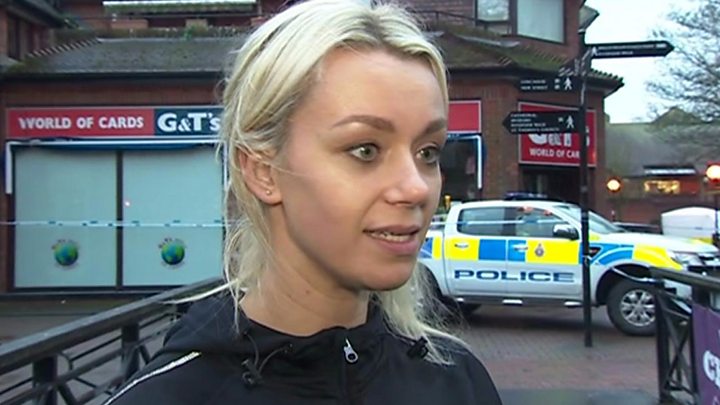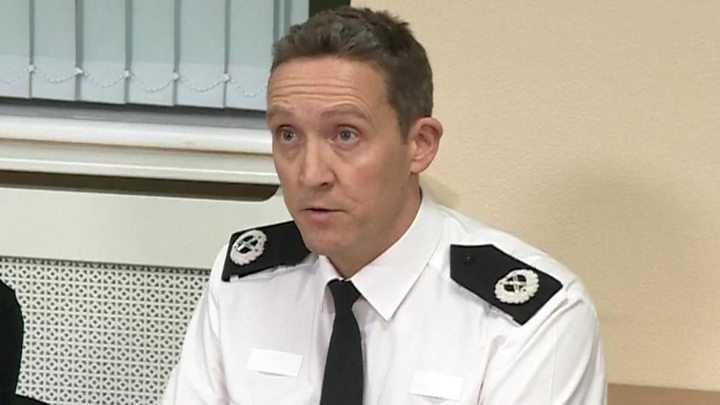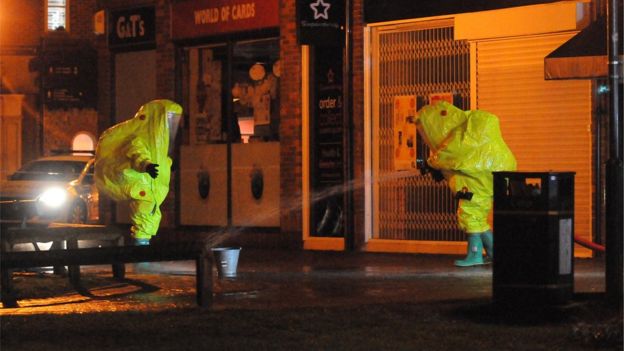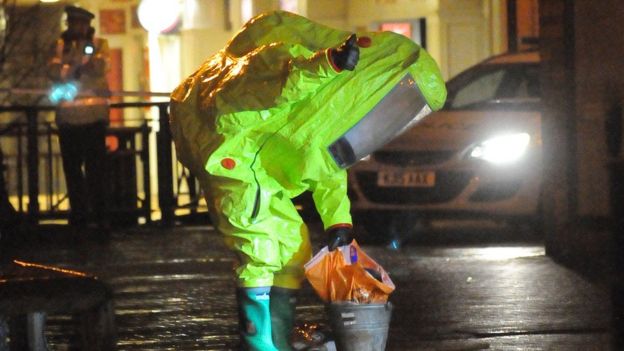
This article is more than
7 year old
Sergei Skripal, 66, was granted refuge in the UK following a "spy swap" between the US and Russia in 2010.
He and a woman, 33, were found unconscious on a bench at a shopping centre in Salisbury on Sunday.
Zizzi restaurant in Salisbury has been closed by police "as a precaution".
The substance has not been identified, but Public Health England said there was no known risk to the public's health.
Wiltshire Police are investigating whether a crime has been committed. They said the pair had no visible injuries but had been found unconscious at the Maltings shopping centre.
They have declared a "major incident" and multiple agencies are investigating. They said it had not been declared as a counter-terrorism incident, but they were keeping an "open mind".
Col Skripal, who is a retired Russian military intelligence officer, was jailed for 13 years by Russia in 2006 for spying for Britain.
He was convicted of passing the identities of Russian intelligence agents working undercover in Europe to the UK's Secret Intelligence Service, MI6.
Russia said Col Skripal had been paid $100,000 for the information, which he had been supplying from the 1990s.
He was one of four prisoners released by Moscow in exchange for 10 US spies in 2010, as part of a swap. Col Skripal was later flown to the UK.
He and the woman, who police said were known to each other, are both in intensive care at Salisbury District Hospital.

A number of locations in the city centre were cordoned off and teams in full protective gear used hoses to decontaminate the street.
The hospital advised people to attend routine operations and outpatient appointments unless they were contacted. It said its A&E department was open but busy because of the weather.
On the restaurant closure, police said Public Health England had reiterated the advice that there was no known risk to the wider public, but as a precaution advised that if people felt ill they should contact the NHS on 111.
"If you feel your own or another's health is significantly deteriorating, ring 999," police said.
Neighbours at Sergei Skripal's home in Salisbury say police arrived around 17:00 GMT on Sunday and have been there ever since.
They said he was friendly and in recent years had lost his wife.

Eyewitness Freya Church told the BBC it looked like the two people had taken "something quite strong".
She said: "On the bench there was a couple, an older guy and a younger girl. She was sort of leant in on him, it looked like she had passed out maybe.
"He was doing some strange hand movements, looking up to the sky...
"They looked so out of it I thought even if I did step in I wasn't sure how I could help."


The possibility of an unexplained substance being involved has drawn comparisons with the 2006 poisoning of Alexander Litvinenko.
The Russian dissident died in London in 2006 after drinking tea laced with a radioactive substance.
A public inquiry concluded that his killing had probably been carried out with the approval of the Russian President, Vladimir Putin.
A spokesman for the Russian Embassy in the UK, when asked for comment on the incident, said: "Neither relatives nor legal representatives of the said person, nor the British authorities, have addressed the embassy in this regard."

By BBC security correspondent Gordon Corera
The parallels are striking with the 2006 case of Alexander Litvinenko.
He, too, was a former Russian intelligence officer who had come to the UK and was taken ill for reasons that were initially unclear.
In that case, it took weeks to establish that the cause was deliberate poisoning, and it took close to a decade before a public inquiry pointed the finger of blame at the Russian state.
Officials are stressing that it is too early this time to speculate on what happened here or why.
The police are not even yet saying a crime has been committed, but if the similarities do firm up and Moscow is once again found to be in the frame there will be questions about what kind of response might be required - and whether enough was done in the past to deter such activity being repeated.

Former Foreign Secretary Sir Malcolm Rifkind said the police approach to the Salisbury incident suggested there could be a "very sinister background".
Speaking on BBC Radio 4's The World Tonight, he said: "It could indeed potentially have been the FSB (Russian intelligence services) or the Kremlin could have been behind it.
"It could have been some form of criminal response for other reasons, or it could be some form of personal grievance some individual had against these two people or either of them.
"We don't know at this stage and it is not going to be useful to speculate beyond that," he added.
Col Skripal was convicted of "high treason in the form of espionage" by Moscow's military court in August 2006. He was stripped off all his titles and awards.
He was alleged by the Russian security service FSB to have begun working for the British secret services while serving in the army in the 1990s.
He had been passing information classified as state secrets and been paid for the work by MI6, the FSB claimed.
Col Skripal pleaded guilty at his trial and co-operated with investigators, reports said at the time.

Were you in the area at the time? Have you been affected by the incident? You can share your experience by emailing haveyoursay@bbc.co.uk.
Please include a contact number if you are willing to speak to a BBC journalist. You can also contact us in the following ways:
You can receive Breaking News on a smartphone or tablet via the BBC News App.You can also follow @BBCBreaking on Twitter to get the latest alerts.